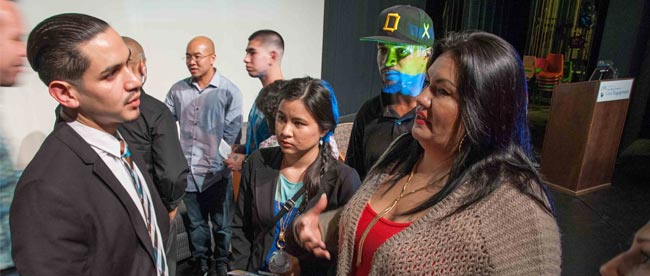The views and opinions expressed in this article are those of the authors and do not necessarily reflect the official policy or position of The San Diego Foundation.
In 2014, San Diego rapper Brandon Duncan (aka Tiny Doo), found himself in jail awaiting trial on charges that he conspired to commit a series of gang related-shootings.
The charges were such that they could land him in prison for life. Despite not shooting a gun or driving a getaway car, prosecutors elected to introduce other evidence to prove Duncan’s guilt – his rap music.
Arguing he profited from the shootings through his rap album “No Safety,” the city’s lawyers charged Duncan, who had no criminal record, under 182.5 of the California Penal Code which states that anyone “who willfully promotes, furthers, assists, or benefits” from felonious criminal conduct by a gang is guilty of conspiracy to commit that felony.
In essence, prosecutors wanted to put Tiny Doo on trial simply for his lyrics. Eventually, the charges were dropped but only after Tiny Doo had spent eight months behind bars.
The Increasing Use of Rap Lyrics as Evidence
Mr. Duncan’s case is far from unique; rap lyrics are increasingly turning up as evidence in courtrooms across the country — a concern I have publicized in op-eds, media interviews and in my TEDx talk, The Threatening Nature of…Rap Music?
Rather than treat rap music as an art form, prosecutors have become skilled at convincing judges and juries that the lyrics are either autobiographical confessions of illegal behavior or evidence of a defendant’s knowledge, motive or identity with respect to alleged crimes.
My research, as well as my experience as an expert witness in such trials, suggests that rap lyrics are of questionable evidentiary value and that their use in the criminal justice system can result in unfair prejudice.
No other form of fictional expression is treated this way in the courts.
Rap’s Poetic License – Revoked!
The movement to criminalize rap lyrics reflects a broader effort to redefine the meaning of rap music — from art or entertainment to autobiographical confessions.
However, the near universal use of stage names in rap is the clearest signal that rappers are fashioning a character, which is often misconstrued as a first-person narrative by those unfamiliar with rappers’ complex and creative manipulation of identity.
This is particularly problematic with gangsta rap, where artists adopt larger-than-life criminal personas and weave embellished, graphic accounts of violence. If audiences don’t appreciate that these are genre conventions, they can easily conflate artist with character and fiction with fact. In effect, they end up putting rap on trial.
But they are indeed genre conventions. Metaphor and hyperbole are among the many poetic devices used by rappers.
And while one can find isolated examples of rappers with real-life connections to crime, it would be a mistake to extend this characterization to rappers generally.
Rap, Race and Racial Inequality
Why does any of this matter? Why should we care about rappers and rap lyrics? Putting rap on trial raises serious questions about social justice, and the equal application of our First Amendment protections and the right of all citizens to receive a fair trial.
But it’s more than that. Are these increases in rap trials just another sign that racism in this country is alive and well?
In these cases, authorities are nearly always prosecuting a young man of color from an impoverished community, someone who already looms as a threatening stereotype in the minds of society. In nearly every case I’ve encountered, the individual being accused and tried is a young African American or Latino male.
Using rap as evidence, then, is not just a matter of art being sacrificed for the sake of an easy conviction. Rather, the practice constitutes a pernicious tactic that plays upon and perpetuates enduring stereotypes about the inherent criminality of young men of color — stereotypes that, ultimately, generate and reproduce racial inequality in America.
Learn more about how The Center for Civic Engagement at The San Diego Foundation is raising awareness on the subject of social justice and how it impacts our youth, our well-being and our region.
Dr. Charis Kubrin is Professor of Criminology, Law and Society at UC Irvine. Kubrin’s research focuses on neighborhoods, race, and violence, including a related line of research examining the intersection of music, culture and social identity, particularly as it applies to hip-hop and minority youth in disadvantaged communities. In 2014 , Professor Kubrin received the University of California, Irvine, School of Social Ecology, Dean’s Diversity Research Award and the American Society of Criminology, Division on People of Color and Crime, Coramae Richey Mann Award.




